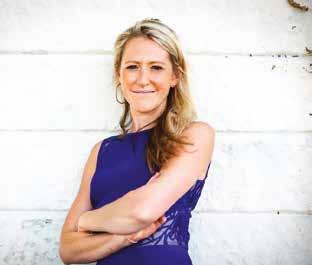
5 minute read
LOOK WHAT YOU MADE ME DO
Celebrities are taking centre stage in campaigns against media portrayal of our bodies. We explore the issues and discover how professional support is changing.
Taylor Swift is an A list celebrity, Hope Virgo is an author and mental health campaigner. Both are publicly highlighting their personal struggles to expose the often hidden trauma of eating disorders.
It’s estimated that over a million people across the UK are living with an eating disorder.
In the new Netflix Taylor Swift documentary Miss Americana, Swift reveals her struggle with anxiety about body image manifested through eating difficulties and excessive exercise.
The film includes a montage of derogatory comments about the singer’s body. Then and now photos illustrate just how thin Swift had become during the ‘1989’ album era versus the healthier look she sported by the time she toured behind the “Reputation” album in 2018. Her undereating in that earlier time severely affected her stamina on tour.
She also told Variety magazine that there had been times when she’d seen “a picture of me where I feel like I looked like my tummy was too big, or... someone said that I looked pregnant... and that’ll trigger me to just starve a little bit – just stop eating.”
Today, criticism doesn’t get to her in the same way and she’s reconciled “the fact that I’m a size 6 instead of a size double zero.”
DOES THE MEDIA’S PROMOTION OF THE ‘BODY BEAUTIFUL’ CAUSE EATING DIFFICULTIES?
Mersey Care Assistant Clinical Psychologist Becky Moon says media attention to body image isn’t all to blame. And there’s a positive flipside.
“The media does play a role, but to say it causes eating disorders is unhelpful. Yes there’s a plethora of unhelpful stuff in the media, but there’s also a lot of helpful information too. Jameela Jamil, for example, is a fantastic advocate for positive body image.”
Media influence is not a new phenomenon. And while it’s unlikely to be the sole cause of eating difficulties, in some cases there is a link, says Clinical Psychologist Hannah Gordon.
“It’s a misconception that people develop eating difficulties simply because they are trying to emulate images of celebrities. But when the media makes comments on a celebrity’s body or appearance it sends out a message that what we look like is important. That may make someone more critical of their own body and appearance, and being very self critical is one of the many factors that make a person more vulnerable to developing eating difficulties.
“If someone is very distressed about their weight and shape, and if they use harmful strategies to try and manage their distress, like excessive exercising, try to restricting what they eat, or self inducing vomiting, it might be useful to think about getting support”. •
• If you or someone you know needs help for eating difficulties visit your GP who may refer you to the Eating Disorder service.
Beat Eating Disorders UK (BEAT) – beateatingdisorders.org.uk
Jameela Jamil interview with Glamour magazine: www.glamour.com/story/ jameela-jamil-on-i-weigh-instagram



Author and campaigner Hope Virgo
WEIGHT IS A ‘SMALL PART OF THE PICTURE’
Author Hope Virgo (above) had kept her eating disorder hidden until she was admitted to a mental health hospital. Her skin was yellowing, her heart failing.
She survived but relapsed in 2016. She self referred but was reportedly told by professionals that she ‘wasn’t thin enough’ for support.
Hope’s Dump the Scales initiative and 100,000 signature petition called on the government to provide adequate GP training around eating disorders, full implementation of the National Institute for Health and Care Excellence (NICE) guidelines through communications and a commitment to bring in a standard to measure and report on this.
NEED SUPPORT?
22 Help yourself – our self help guide on eating disorders can be read online, downloaded or watched as a video.
EATING DISORDERS Support for you
In her book ‘Stand Tall Little Girl’ Hope recalls: “I was terrified of ending up in hospital again. Getting to that point where I would lose control. That relentless anorexic voice nagging at me, day in and day out. After four months of battling with that voice in my head I decided it was time I reached out for help.
“I referred myself to an eating disorder unit, only to be told that I wasn’t thin enough for support. All I had wanted was someone to talk to, someone to take my relapse seriously and to give me some help. I felt like a fake. A hypocrite.”
Mersey Care’s Eating Disorders team takes a different approach. They look at the psychological impact of the eating difficulty rather than the person’s weight as a criterion for referral, and welcome people of any weight or size.
Becky Moon explains. “We try to be as inclusive as possible. We see people who are underweight, healthy weight or overweight, as long as they meet the diagnostic criteria for eating difficulties. For example someone who is overweight may be binge eating or have bulimia. “We know that weight is a small part of the picture. It’s the distress that the person is feeling that we’re hoping to change, whether that’s to boost their self esteem or change how they feel about their body,” she says.
Mersey Care psychologists often talk about ‘eating difficulties’ rather than specific disorders.
Hannah Gordon explains: “For some people labels give a short way to explain their difficulties. But for others they can oversimplify the person’s distress and the numerous factors that play a part in their eating difficulties. We build an individual psychological understanding of each client’s eating difficulties, something that makes sense to them.”
The team offers a range of group and individual therapeutic approaches, led by psychologists or psychotherapists. They include compassion focused therapy, which works with the shame that people feel around their eating difficulties and offers coping strategies such as meditation and mindfulness.
Hope Virgo’s book: Stand Tall Little Girl: Facing Up to Anorexia is available on Amazon.co.uk
The National Eating Disorders Association (NEDA) has an extensive list of signs to watch for. It includes things like:
• being preoccupied with weight, food, calories, fat content, and dieting
developing food rituals, like eating foods in a certain order or excessively chewing each bite •
• withdrawing from friends and activities
expressing concern about eating in public
having difficulty concentrating, dizziness, or sleep problems.










